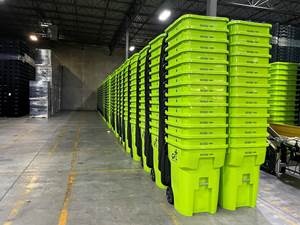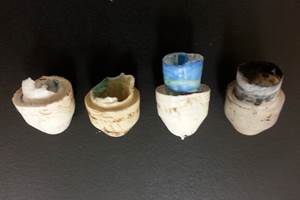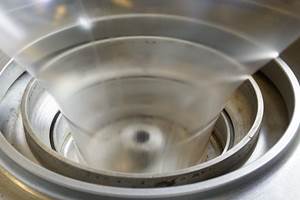Blow Molding
The latest introductions in extrusion blow molding focused on faster color changeovers, higher bottle production, and integration with form-and-fill operations. In PET stretch-blow equipment, new models showed enhanced capabilities, such as making a 90-liter container from 100% recycled PET, molding PET jars and bottles on a standard injection-blow press, and stretch-blowing a wider range of resins. There was also news in downstream deflashing technology.
Quick-Purge Accumulator
Fast color change is the attraction of new S-series spiral accumulator heads from Davis-Standard Blow Molding Systems, Edison, N.J. Offered only with monolayer capability at present, they reportedly can complete a light-to-dark color change in seven shots, versus 30 to 40 shots for conventional accumulators. The design is also said to reduce pressure drop and improve wall-thickness uniformity. The S line will be offered in sizes of 5 to 75 lb.
New-Style Wheel
Want to produce 4-oz to 2.5-gal juice and dairy containers at rates of 25 million to more than 200 million bottles a year? Then you may want to take a look at the 12-station vertical rotary unit offered by Wilmington Machinery, Wilmington, N.C. This new style of rotary machine makes containers with one to three parisons and 12 to 18 mold stations (each with a 7.5-ton, cam-operated toggle clamp). A 6-in., 30:1 extruder with 300-hp drive can produce 3600 bottles/hr with a single parison. Up to seven-layer coextrusion and in-mold labeling are offered.
This is Wilmington’s first all-electric machine. It is less expensive than the firm’s other machines because it has one wheel instead of two.
Blow It, Fill It, Seal It
Techne North America Inc., Bensenville, Ill., has developed a new long stroke machine with fill-and-seal capability. The new All-Pac 10000 form/fill/seal machine is a 13-cavity model that makes up to 1-liter containers. It has a 1-ton clamp on a linear-bearing slide mechanism that is said to give high repeatability. Other features include bottle trim and deflashing inside the machine and integrated top-load and leak testing. Downstream auxiliaries include a filler and bottle weigh scale.
Long & Longer Strokes
Techne has also lengthened the stroke on its 4000 Series machine to permit higher mold cavitation.
Automa Machine & Tool Inc., Maple Grove, Minn., has also stretched the stroke of its AT 10 single- and dual-sided shuttle machines to 660 mm from 600 mm, allowing for more or larger cavitation. It can make up to a 15-liter container in a single cavity or 250-cc bottles in 10 cavities. Linear bearings for the mold carriage replace tiebars for better rigidity and smoother motion.
Bigger PET Machines
The largest stretch-blow molded object ever made—a 90-liter container made 100% of recycled PET—and the new machine that produced it both made their U.S. debut at the show. The 3000H-60 injection-stretch-blow unit from Aoki Laboratory America, Elk Grove Village, Ill., can mold and blow a preform 713 mm long x 140 mm wide. Onishi Trading Co. of Japan is selling the container, which is being used as a refuse deposit next to a vending machine.
Heat set, wide mouth, and multi-layer capability will all be brought together in an updated line of machines from Nissei ASB Co., Atlanta. The new features are not expected to increase cycle times. The firm says its machines can run up to five layers using three materials.
In other developments, Nissei said it raised the ovality ratio of its PF8-4 machine to 2.5:1 from 2:1. Output rates are the same even with the upgraded feature.
Nissei also announced that its more traditional ASB machines can now run a range of materials, including PP, PS, or polycarbonate. In addition, it has developed a special machine to produce 5-gal containers from PET or polycarbonate. It allows a user to serve the 5-gal market with newer and cheaper PET products, while still making PC containers for customers that are slow to change. Nissei says PC is 30-40% more costly than PET.
Injection-Blow Units Will Take Up PET
Molding PET without stretching on standard rotary injection-blow machines is a new capability that Jomar Corp., Pleasantville, N.J., will offer soon after the expiration of a Wheaton patent on the process this month. This method is reportedly suited to making wide-mouth pharmaceutical and cosmetic containers with high gram weights.
Jomar also showed its capability to mold unstretched PET on a three-station machine with vertical injection and horizontal clamps. Jomar’s 85-S model molded 75-cc PET bottles in eight-cavity molds at 2900 bottles/hr on a 9.8 sec/cycle.
News in PET Reheat-Blow
A new capability on the USP line of rotary reheat stretch-blow machines from Urola scl of Legazpi, Italy, is the ability to mold handles on PET bottles. This is said to be the first reheat model with this capability. At the show, Urola’s USP 2 model made 5-liter PET bottles at 900/hr in a single cavity.
New Auxiliary Device
Rocheleau Tool & Die Co. Inc., Fitchburg, Mass., developed an automated takeout and deflashing system for bottle sizes up to 1 gal. The new unit is used with the firm’s RS-25 extrusion blow molder, which can produce bottles up to 5 gal in a single cavity. It is offered in one- to three-head punch configurations and operates at up to 1800 bottles/hr. The unit features quick connects for fast changeovers.
Related Content
Injection Molder Changes Up Color Changes
An injection molder of trash cans, pallets, totes and other plus-size components, Rehrig Pacific’s machine fleet is composed of larger tonnage presses whose size makes material changes at the feed throat a potentially dizzying exercise.
Read MoreHow to Start a Hot-Runner Mold That Has No Tip Insulators
Here's a method to assist with efficient dark-to-light color changes on hot-runner systems that are hot-tipped.
Read MoreReduce Downtime and Scrap in the Blown Film Industry
The blown film sector now benefits from a tailored solution developed by Chem-Trend to preserve integrity of the bubble.
Read MoreUpdated Controller for Sealed Gravimetric Liquid Color and Additives System
NPE2024: Riverdale Global’s new RGS controller features and intuitive set-up procedure.
Read MoreRead Next
For PLASTICS' CEO Seaholm, NPE to Shine Light on Sustainability Successes
With advocacy, communication and sustainability as three main pillars, Seaholm leads a trade association to NPE that ‘is more active today than we have ever been.’
Read MoreBeyond Prototypes: 8 Ways the Plastics Industry Is Using 3D Printing
Plastics processors are finding applications for 3D printing around the plant and across the supply chain. Here are 8 examples to look for at NPE2024.
Read MorePeople 4.0 – How to Get Buy-In from Your Staff for Industry 4.0 Systems
Implementing a production monitoring system as the foundation of a ‘smart factory’ is about integrating people with new technology as much as it is about integrating machines and computers. Here are tips from a company that has gone through the process.
Read More





















